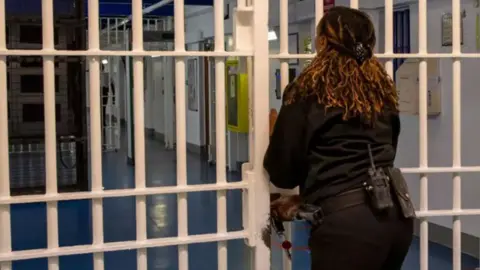'Tough on crime' policies behind prison crisis, says review
 Getty Images
Getty ImagesSuccessive governments trying to look "tough on crime" have driven the rising prison population which forced the early release of thousands of inmates last year, a review suggests.
The report by the Independent Sentencing Review found governments over the past 25 years jailed more criminals, despite evidence it does not prevent re-offending.
The review, led by former lord chancellor David Gauke, also found there were "knee-jerk" decisions to issue longer sentences in an effort to show government action.
Mr Gauke warned that unless radical changes are made this year, prisons in England and Wales could run out of cells again by spring 2026.
"It's only a matter of time before, once again, prison numbers will exceed capacity," Mr Gauke told the BBC's Radio 4 Today programme.
England and Wales has one of the highest prison population rates in western Europe, according to the report.
Despite an overall decline in crime since the mid-1990s, England and Wales' prison population has almost doubled between 1993 and 2012, the review found, while reoffending has stayed stubbornly high.
The government launched an early prisoner release scheme in September last year as part of an emergency plan to tackle overcrowding.
It saw eligible prisoners serving more than five years automatically released after only 40% of their fixed-term sentence, rather than the usual 50%.
The government then commissioned the report to examine how prisons became so full, and to consider ways to ease overcrowding by giving tougher punishments outside of prison. The panel's recommendations are due in spring.
The review found that the early release scheme freed up enough spare cells for newly-remanded or convicted criminals, but that headroom will disappear by next year, even with more prison places being built.
Mr Gauke said: "Last year we were confronted with the consequences of decades of haphazard policy making and underinvestment in the criminal justice system - bringing it to the brink of collapse.
"For too long politicians have operated in a vacuum, increasing sentencing for individual crimes without considering the knock-on impact on the wider system."
He said the system had failed victims, and that while punishment would always be a central aim of the criminal justice system, "prison is not the only form of punishment".
Figures show that almost six out of 10 offenders jailed for less than a year go on to break the law again - a cycle of criminality that had been feeding more and more people into the prison population.
In contrast, fewer community sentences have been handed out by courts and there has been decades of under-investment in probation teams, who are charged with offenders in the community, and proven rehabilitation programmes.
As a consequence, more money has been spent on emergency overcrowding measures, including building more jails, rather than on punishment in the community and cheaper programmes aimed at stopping offending in the first place.
Mr Gauke's review found that the prison population began to balloon as Labour and Conservative administrations competed to introduce tougher and tougher measures aimed at jailing people.
"Over the last 25 years, the political landscape has been increasingly dominated by a 'tough on crime' narrative that has focused on longer imprisonment. In tandem, politicians have implemented legislative and policy changes which have inflated sentencing," it reads.
Mr Gauke told the BBC that the last 30 years have seen "something of a bidding war between political parties as to who is prepared to lengthen sentences the most".
"As a consequence, we've seen our prison population essentially double over that time," he added.
"We now have the highest incarceration rate in western Europe and with that comes consequences, not least the fact that prison is pretty expensive."
